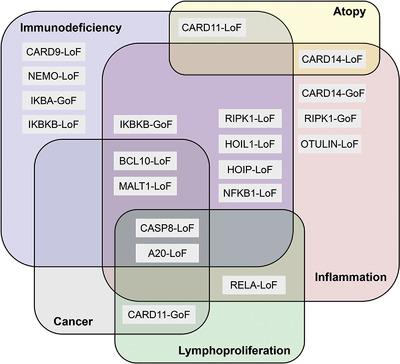当前位置:
X-MOL 学术
›
J. Leukoc. Biol.
›
论文详情
Our official English website, www.x-mol.net, welcomes your
feedback! (Note: you will need to create a separate account there.)
Mendelian diseases of dysregulated canonical NF-κB signaling: From immunodeficiency to inflammation.
Journal of Leukocyte Biology ( IF 3.6 ) Pub Date : 2020-07-17 , DOI: 10.1002/jlb.2mr0520-166r Oskar Schnappauf 1 , Ivona Aksentijevich 1
Journal of Leukocyte Biology ( IF 3.6 ) Pub Date : 2020-07-17 , DOI: 10.1002/jlb.2mr0520-166r Oskar Schnappauf 1 , Ivona Aksentijevich 1
Affiliation

|
NF‐κB is a master transcription factor that activates the expression of target genes in response to various stimulatory signals. Activated NF‐κB mediates a plethora of diverse functions including innate and adaptive immune responses, inflammation, cell proliferation, and NF‐κB is regulated through interactions with IκB inhibitory proteins, which are in turn regulated by the inhibitor of κB kinase (IKK) complex. Together, these 3 components form the core of the NF‐κB signalosomes that have cell‐specific functions which are dependent on the interactions with other signaling molecules and pathways. The activity of NF‐κB pathway is also regulated by a variety of post‐translational modifications including phosphorylation and ubiquitination by Lys63, Met1, and Lys48 ubiquitin chains. The physiologic role of NF‐κB is best studied in the immune system due to discovery of many human diseases caused by pathogenic variants in various proteins that constitute the NF‐κB pathway. These disease‐causing variants can act either as gain‐of‐function (GoF) or loss‐of‐function (LoF) and depending on the function of mutated protein, can cause either immunodeficiency or systemic inflammation. Typically, pathogenic missense variants act as GoF and they lead to increased activity in the pathway. LoF variants can be inherited as recessive or dominant alleles and can cause either a decrease or an increase in pathway activity. Dominantly inherited LoF variants often result in haploinsufficiency of inhibitory proteins. Here, we review human Mendelian immunologic diseases, which results from mutations in different molecules in the canonical NF‐κB pathway and surprisingly present with a continuum of clinical features including immunodeficiency, atopy, autoimmunity, and autoinflammation.
中文翻译:

规范性NF-κB信号传导异常的孟德尔疾病:从免疫缺陷到炎症。
NF-κB是一个主要转录因子,可响应各种刺激信号激活靶基因的表达。活化的NF-κB介导多种多样的功能,包括先天性和适应性免疫反应,炎症,细胞增殖,并且NF-κB通过与IκB抑制蛋白的相互作用进行调节,而IKB抑制蛋白又由κB激酶(IKK)复合物的抑制剂调节。这三个组成部分共同构成了NF-κB信号小体的核心,它们具有特定于细胞的功能,这些功能取决于与其他信号分子和途径的相互作用。NF-κB途径的活性还受多种翻译后修饰的调控,包括Lys63,Met1和Lys48泛素链的磷酸化和泛素化。由于发现了由构成NF-κB途径的各种蛋白质中的致病变异引起的许多人类疾病,因此在免疫系统中对NF-κB的生理作用进行了最佳研究。这些引起疾病的变体可以起到功能获得(GoF)或功能丧失(LoF)的作用,并且根据突变蛋白的功能,可能导致免疫缺陷或全身性炎症。通常,致病性错义变体起GoF的作用,并导致该途径中的活性增加。LoF变异体可以作为隐性或显性等位基因遗传,并且可以导致途径活性降低或升高。大量遗传的LoF变异通常会导致抑制蛋白的单倍不足。在这里,我们回顾人类孟德尔免疫系统疾病,
更新日期:2020-08-04
中文翻译:

规范性NF-κB信号传导异常的孟德尔疾病:从免疫缺陷到炎症。
NF-κB是一个主要转录因子,可响应各种刺激信号激活靶基因的表达。活化的NF-κB介导多种多样的功能,包括先天性和适应性免疫反应,炎症,细胞增殖,并且NF-κB通过与IκB抑制蛋白的相互作用进行调节,而IKB抑制蛋白又由κB激酶(IKK)复合物的抑制剂调节。这三个组成部分共同构成了NF-κB信号小体的核心,它们具有特定于细胞的功能,这些功能取决于与其他信号分子和途径的相互作用。NF-κB途径的活性还受多种翻译后修饰的调控,包括Lys63,Met1和Lys48泛素链的磷酸化和泛素化。由于发现了由构成NF-κB途径的各种蛋白质中的致病变异引起的许多人类疾病,因此在免疫系统中对NF-κB的生理作用进行了最佳研究。这些引起疾病的变体可以起到功能获得(GoF)或功能丧失(LoF)的作用,并且根据突变蛋白的功能,可能导致免疫缺陷或全身性炎症。通常,致病性错义变体起GoF的作用,并导致该途径中的活性增加。LoF变异体可以作为隐性或显性等位基因遗传,并且可以导致途径活性降低或升高。大量遗传的LoF变异通常会导致抑制蛋白的单倍不足。在这里,我们回顾人类孟德尔免疫系统疾病,









































 京公网安备 11010802027423号
京公网安备 11010802027423号